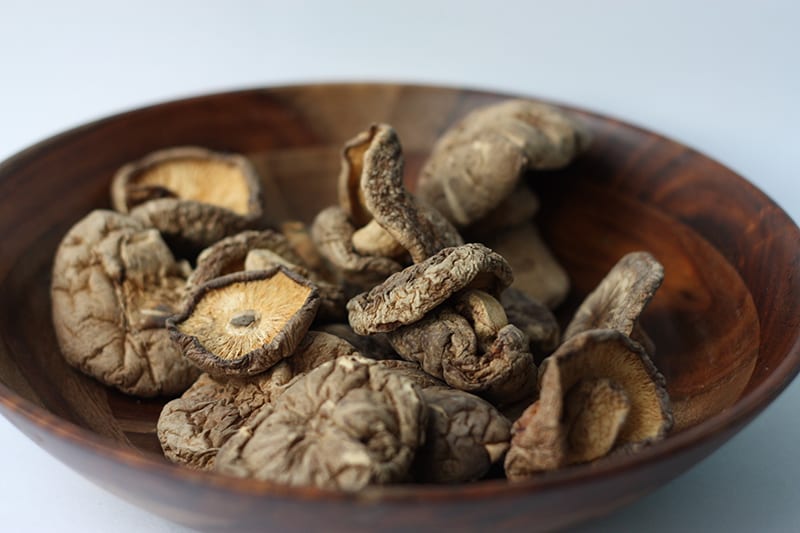
Medicinal Mushrooms and Our Pets
By Carol Kendig
Lately, there has been ample publicity about the benefits of medicinal mushrooms for human usage but not nearly as much information is available for our canines and felines. First, we must acknowledge the difference between wild fungus species growing in the forest or in your backyard and medicinal mushrooms. Never let your pet consume mushrooms growing wild. Even if you can positively identify a fungus species as non-poisonous to humans, it may still be harmful to your pet. Please do not take a chance because the results could be fatal to your best friend.
Three Beneficial Mushrooms for Your Cat or Dog
However, medicinal mushrooms are a different story. These valuable fungi have been studied for centuries and their advantages are well documented. Three mushroom species that have been thoroughly researched and deemed extremely safe for canines and felines are: Maitake (Grifola frondosa), Reishi (Ganoderma lucidum), and Shiitake (Lentinula edodes).
Maitake (Grifola frondosa)
Maitake, also called Hen of The Woods, is best known for its immune enhancing properties. That makes sense because these mushrooms are an outstanding source of vitamin D2, the sunshine vitamin. To increase the vitamin D2 content of any of the mushrooms you use, simply slice and place them gill-side-up under direct sunlight for a few hours. Maitake is a well-known anti-inflammatory that supports the immune system. This species has naturally occurring antioxidants, phenols, flavonoids, and ascorbic acid; all of which help protect against diseases. Maitake is a flavorful mushroom, semi-firm, chewy, aging to toughness.
Maitake is used for:
- Cancer prevention
- Support during chemotherapy and radiation treatments
- Help with managing diabetes
- Support for the liver
- Regulating blood pressure
Reishi (Ganoderma lucidum)
Reishi is called The Mushroom of Immortality for its life-extending properties. This species contains Zinc, Vitamin C, and Selenium, which fight free radicals and support healthy cells. Numerous clinical studies have verified that Reishi mushrooms have impressive anti-inflammatory effects and other broad health benefits, including energy enhancement. This mushroom has a bitter taste so is better suited for powder or supplement form.
Reishi can help:
- Boost immune system
- Improve sleep
- Cancer treatment
- Increase cardiovascular function
- Arthritis
- Allergies
- Upper respiratory infections (viral)
- Anti-aging properties
Shiitake (Lentinula edodes)
Shiitake mushrooms are well known for their anti-viral, anti-microbial, and anti-Candida effects. These powerhouse mushrooms stimulate white blood cell production and improve circulation. They are high in B vitamins, selenium, vitamin D2, pantothenic acid, and other helpful nutrients. Shiitake’s benefits include fighting infections and aiding bone health. This mushroom is tasty.
Shiitake is used for:
- Reducing side effects of chemotherapy and radiation
- Help in treating Cushing’s Disease
- Regulating incontinence
- Lowering cholesterol levels
- Improving cardiovascular health
- Skin problems
Make Sure You Are Getting Quality Mushrooms
If possible, always use organically raised mushrooms that have been grown on a species-appropriate growing matrix (straw, wood, compost, etc.). Many mushroom products today are grown on grain which produces copious amounts of mycelium. Unfortunately, according to most mycologists, mycelium does not have the nutritional benefits of actual fruiting-body mushrooms, so investigate thoroughly before purchasing mushroom powders or capsules. Everyone wants an effective product when purchasing supplements: caveat emptor (buyer beware)! Capsules can be given by hand and powders can be sprinkled over food.
If you are going to feed your dog or cat whole mushrooms, you will find cooked rather than raw mushrooms are easier on their digestive systems. One easy way to feed your pet whole mushrooms is to make Mushroom Broth.
Mushroom Broth:
- 1 cup sliced fresh mushrooms, if using dehydrated milk soak until soft and then slice
- Sauté in a pan with butter
- Add 2 cups of water
- Simmer for 20 minutes
- Blend for a soupy consistency
- You may add herbs to this broth for even more healthful benefits.
- Give your pet 1 tablespoon per 25 pounds of body weight. Freeze leftover the amount in ice cube trays. One cube equals 2 tablespoons.
Medicinal Benefits Take Time
Remember that medicinal mushrooms work slowly. Most benefits will not be noticed before 1 – 3 months have passed, and those effects are often subtle. For example, you may notice a general sense of increased well-being or lessening of negative symptoms but be assured good things are happening internally. These three varieties of mushrooms are also considered to be nutraceuticals or medicinal foods. They are true adaptogens, generally safe for everyone, good at lowering stress, reducing infections, and working to balance hormones. Adding any one of these fungi to your pet’s diet may make the difference between average health to vibrant health and standard life expectancy to increased longevity. Explore medicinal mushrooms for your own pet. They might prove to be the powerful, nutrient-packed ingredient that improves your best friend’s life.